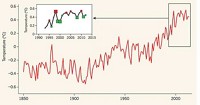Advertisement
Grab your lab coat. Let's get started
Welcome!
Welcome!
Create an account below to get 6 C&EN articles per month, receive newsletters and more - all free.
It seems this is your first time logging in online. Please enter the following information to continue.
As an ACS member you automatically get access to this site. All we need is few more details to create your reading experience.
Not you? Sign in with a different account.
Not you? Sign in with a different account.
ERROR 1
ERROR 1
ERROR 2
ERROR 2
ERROR 2
ERROR 2
ERROR 2
Password and Confirm password must match.
If you have an ACS member number, please enter it here so we can link this account to your membership. (optional)
ERROR 2
ACS values your privacy. By submitting your information, you are gaining access to C&EN and subscribing to our weekly newsletter. We use the information you provide to make your reading experience better, and we will never sell your data to third party members.
Environment
Climate Sensitivity
by Rudy M. Baum
October 3, 2011
| A version of this story appeared in
Volume 89, Issue 40
Climate scientists are hypersensitive these days to any suggestion that they are overstating the impact of global climate disruption. They’ve been burned too often by climate-change deniers mining massive reports for errors and using them to attempt to challenge the overall reality of climate disruption. That stands in stark contrast to the propensity of climate-change deniers to misrepresent scientific findings or just make stuff up.
The latest kerfuffle centers on a map in the new edition of “The Times Comprehensive Atlas of the World” that depicts Greenland as having lost 15% of its ice since 1999 with much of its coastline ice free. Science magazine’s ScienceInsider policy blog reported that “glaciologists are broadly and loudly panning” the map as a gross distortion of the extent of ice loss on Greenland. The New York Timesreported that a scientist at the National Snow & Ice Data Center (NSIDC) expressed fear in an e-mail that the map “could pull climate scientists into another vortex of damaging controversy.”
That other controversy arose from a paragraph in a 2007 report by an Intergovernmental Panel on Climate Change (IPCC) working group that stated that the Himalayan glaciers would disappear by 2030. That’s actually not going to happen, and no scientist had ever said it was going to happen, but climate-change deniers seized on the error as proof that climate scientists regularly overstate the potential impacts of climate change caused by greenhouse gas emissions.
Well, I’m glad that glaciologists jumped all over the mistake about Greenland. It’s an important atlas, after all. What’s amusing is that what is really an inconsequential mistake would cause such consternation. It demonstrates how successful climate-change deniers have been in confusing the public about the state of climate-change research.
This is nothing new, of course. In the book “Merchants of Doubt,” Naomi Oreskes and Erik M. Conway showed how a cadre of scientists had used the same dishonest techniques to try to cast doubt on issues ranging from the dangers of cigarettes to the reality of climate change. They’re still at it. At the website Climate Depot, a clearinghouse for climate-change denial material, for example, it is easy to find claims that Arctic sea ice is rapidly recovering from a low point reached in 2007.
At the NSIDC website, however, you’ll find that as of Sept. 15, Arctic sea ice had reached its lowest extent for the year and that, “The minimum ice extent was the second lowest in the satellite record, after 2007, and continues the decadal trend of rapidly decreasing summer sea ice.” You’ll also find a graph that shows the extent of Arctic sea ice in 2007, 2008, 2010, and 2011 averages about 33% lower than the 1979–2000 average. So no, Arctic sea ice is not recovering. They just made that up.
At Climate Depot, you can also find a link that reads: “Man-made global warming crisis crusaders facing a new threat … Challenged by new scientific evidence of important solar influences upon climate that can’t readily be blamed on us” which takes you to an article in Forbes linking sunspot activity to climate change entitled “Sorry, But With Global Warming It’s The Sun, Stupid.” The problem here is that there is absolutely nothing new. The article misrepresents the work of scientists at CERN, the European Organization for Nuclear Research, and touts as something new—sunspot activity affecting the flux of cosmic rays on Earth—a phenomenon IPCC dealt with in its 2001 and 2007 reports and continues to investigate.
As is so often the case, Garry Trudeau captured the situation well in “Doonesbury.” In the Sept. 25 strip, NPR host Mark Slackmeyer interviews “an honest” businessman who states: “The scientific case for global warming is overwhelming—and it grows daily. Only a moron would deny it.” He goes on to say that he doesn’t oppose sound climate policy because it’s flawed. “I oppose it because I care much more about my short-term economic interests than the future of the damn planet! Hello?”
Thanks for reading.



Join the conversation
Contact the reporter
Submit a Letter to the Editor for publication
Engage with us on Twitter